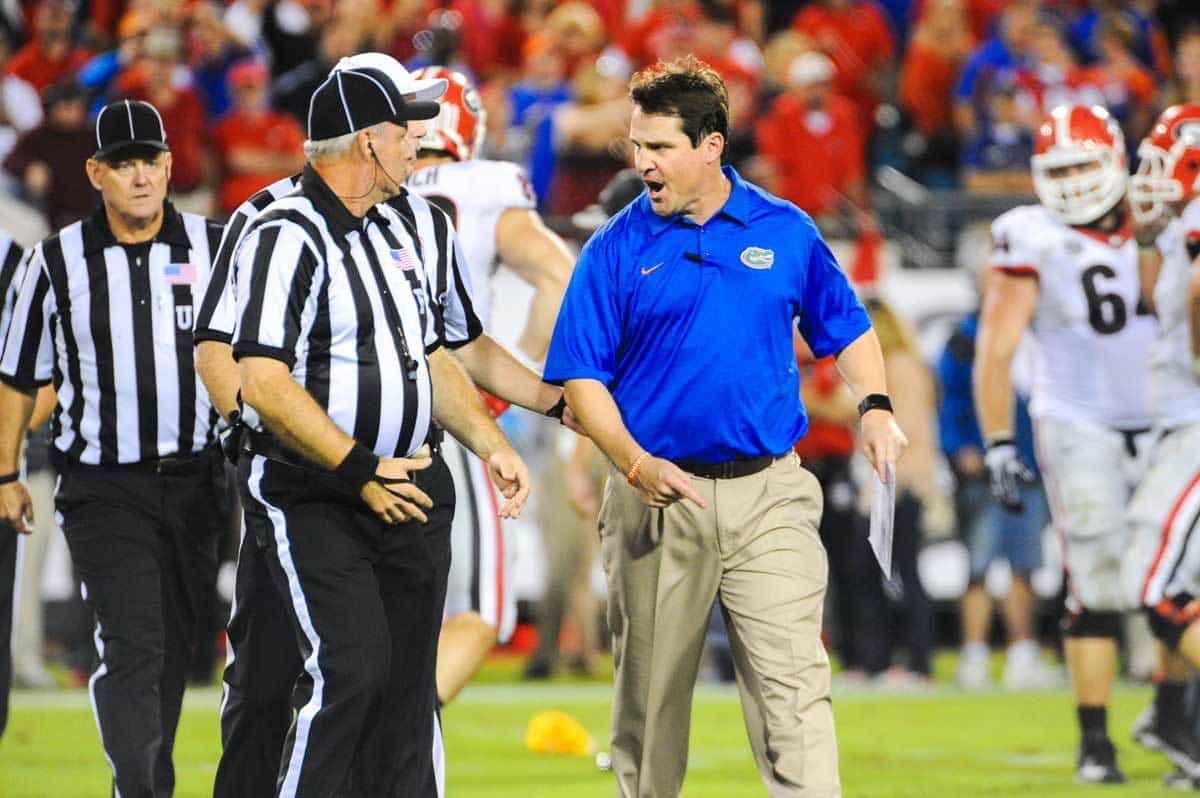The alarm clock screams, jolting you out of bed each morning. Didn’t I just set that thing an hour ago? It’s the daily wake up call that you know is coming but you’re never truly ready for.
The football team got a very different wake up call last Monday.
With no classes scheduled due to Veteran’s Day, the football team woke up bright and early for team meetings. Little did they know, their alarm clocks waking them would be the easiest part of their morning. After stressing penalties every day in practice, Will Muschamp tried a new method to get his point across. He posted a list of every penalty that every player has committed this season in front of the entire team.
“We just had a list of people that had penalties and everything,” Jon Halapio said. “When you show and display that in front of the whole entire team you can feel the accountability and, you know, embarrassment I guess you would say, when you’re getting called out in front of the team like that.”
Stressing Florida’s need to cut back on penalties isn’t anything new. The coaching staff has been stressing it every week for the past three seasons as the Gators have been the most penalized team in the SEC each year under Muschamp. For one reason or another, the message hasn’t sunk in to the point where there is actual change happening on the field on Saturdays.
“This past team meeting a lot of people cared after what Will Muschamp had to say,” Jon Halapio said. “I think we’re definitely taking into consideration about the penalties and we’re gonna do a better job with that.”
Being heavily penalized is nothing new at the University of Florida and it certainly isn’t something new that started under Muschamp. Following Florida’s loss, Muschamp pointed out that Florid has finished as either the most penalized team or second most in 20 of the last 24 seasons.
Since 2007 Florida has been 85th or worse in penalties/game every year, only once have they been better than 105th.
— Richard Johnson (@RagjUF) November 12, 2013
Taking a look back at the numbers since 2007, Florida the best the Gators have done is an 85th place finish nationally in penalties per game. All the other years, the Gators were on the other side of 100 and that includes a national championship season followed by another 13-1 and last year’s 11-2.
So what is the difference this season? Why are the Gators unable to overcome shooting themselves in the foot when they have done it in the past?
One chief reason is that Florida’s margin of error is way too small and was rendered non-existent by the rash of injuries that have plagued the team since spring practice.
And the current roster simply isn’t good enough to withstand the hit of more than eight flags a game. The offense is not built to be successful in second-and-long or third-and-long scenarios and they don’t have a scheme established to be able to strike quickly.
Florida leads the SEC in time of possession (35:08) but averages the fewest plays per minute in the SEC. This is an offense that moves slower than molasses on a cold night in the Artic.
An offense that was atop the SEC in 2007, 2008 and 2009 hasn’t ranked higher than 10th in the past three seasons and is on the way to finishing dead last in 2013. Florida’s inability to dig its way out of a hole created by penalties by putting up points is fairly evident. From 2007-09, the Gators never averaged fewer than 35 points a game and had the ability to strike at a moment’s notice to erase a penalty, whether senseless or aggressive.
Since 2010, the Gators haven’t scored more than 29 points per game and the offense has been in steady decline — with the exception of last season — in every major offensive category.
It’s easy to point to the penalties as a major contributing factor to a dismal season but penalties are not the main issue. As it has been pointed out, penalties are something that Florida has been able to overcome in the past. The real problem is the offense, which still searches for answers as we head into the tenth game of the season.
“I go to work every day tying to find ways to get this football team better and get them to improve on how we play,” Will Muschamp said. “That’s part of your job whether you’re 9-1 at this point or you’re where we are. It’s frustrating. It’s very frustrating, but you work and people are dependent on you to do a good job. Do a good job for the players and do a good job for the university — that’s my job.”



Has WM ever addressed his own “anger management” problem while under live fire? Live fire means during a real Gator football game. Military wise, a soldier unable to control his emotions under live fire would not be allowed anywhere near a front line. Why? Anyone losing it like he does can no longer think good enough to make the next right decision. I’m not saying have no emotion during a game. Just don’t foam at the mouth and lose the ability to think.